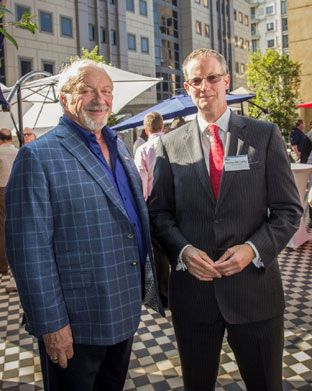Members of the USA Poultry & Egg Export Council met local business and new importers during a visit to South Africa last month.
The USA Poultry & Egg Export Council (USAPEEC) hosted its international staff meeting in South Africa, bringing producer members to the country to explore opportunities and meet potential local counterparts. Coinciding with the visit, US Senator Chris Coons, heading up a US Senate delegation to four African countries, also met importers and industry stakeholders while in South Africa.

USA Poultry & Egg Export Council (USAPEEC) hosted its international staff meeting in South Africa, bringing producer members to the country to explore opportunities and meet potential local counterparts. The event offered U.S. producers of chicken, turkey, duck and eggs an opportunity to discover South Africa and meet historically disadvantaged individuals now joining the importer programme.
From left to right: USAPEEC President Jim Sumner and US Consul General Michael McCarthy attending a networking cocktail reception in Sandton.
The event offered US producers of chicken, turkey, duck and eggs an opportunity to discover South Africa and meet historically disadvantaged individuals now joining the importer programme. This programme enables new previously disadvantaged importers to benefit from imports of US bone-in chicken pieces, which resumed two years ago in line with the African Growth Opportunity Act (AGOA) bilateral trade agreement. While US chicken import quotas are limited to 65,000 tons per year, USAPEEC strives to ensure that smaller local importers are allocated a proportion of the import quotas, enabling them to launch import businesses of their own. Turkey, duck and egg imports from the United States are not restricted by the quota.
USAPEEC President Jim Sumner reports that there is keen interest from the American poultry industry and South African poultry stakeholders alike to enhance mutually beneficial trade and development programmes. In addition to opportunities presented to local importers, the World Poultry Foundation (WPF) is collaborating with the KwaZulu Natal Poultry Institute (KZNPI) to support improved poultry production in South Africa. The training initiative aims to improve production skills and farm management capabilities of small-scale South African poultry and egg farmers in rural areas. A train the trainers programme was developed to improve poultry production skills, which has now benefited over 50 extension officers, with a goal of training 100.
Last year, USAPEEC together with the US Department of Agriculture (USDA) staged a high-level three-day seminar for officials from eleven African countries, where American veterinary and poultry experts shared best practice in the prevention and control of avian influenza outbreaks.
Sumner says that importation of US bone-in chicken parts totals less than 3% of South African chicken consumption and therefore does not make a significant impact on the market, but does provide consumers more choices. With import duties amounting to 37%, in addition to the cost of shipping the meat from the US, the American imports should not be considered as unfair competition to local production but do provide reasonably priced options of an exceptionally high quality product that is the same poultry that is consumed in the USA. The US also exports whole turkey products and turkey cuts to South Africa. The importation of table eggs and egg products are also under discussion between the two government agencies.
Speaking at the USAPEEC networking event, Georg Southey, Chairman of the Association of Meat Importers and Exporters, noted that while chicken imports are a topic of heated debate in South Africa, US imports are not disturbing the market at the current levels of trade. “Only between 10% and 15% of all chicken consumed in South Africa is imported; and of that, only 15% of total imports are from the US. So American chicken accounts for between 2.5% and 3% of all chicken consumed in the country at the moment,” he said.
Sumner notes: “The best way to make any industry or any economy competitive is to introduce fair competition. It makes them sharpen their pencils professionally. So the US chicken imports should help South Africa’s domestic industry look at ways they can operate more efficiently.” If there is no competition, South African consumers may not be able to afford chicken as often as they want.
For further information FAQs, visit the US Chicken in South Africa website: http://usapoultry-rsa.co.za/ or follow www.facebook.com/USpoultryRSA/ or https://twitter.com/USpoultryRSA.







































